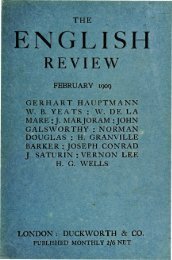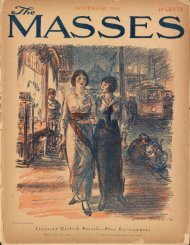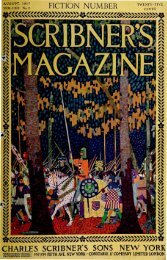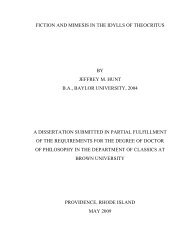View PDF - Brown University Library
View PDF - Brown University Library
View PDF - Brown University Library
- No tags were found...
Create successful ePaper yourself
Turn your PDF publications into a flip-book with our unique Google optimized e-Paper software.
their souls as their own. Publicity is thegreat modern substitute for conscience. Itundoubtedly has its uses within the individualmind, and we ignore them at our peril.A terrifying incident of one's childhood, resolutelyforgotten by what would seem acommendable effort of self-control, maywork its revenge in some strange and compromisingperformance of an over-tiredbrain years afterward, or in lifelong stammering,or some other inability to adjustoneself to the difficulties of ordinary existence.All that is needed is publicity, thehowl in place of the wince. The psychiatristdevotes all his powers to finding thatlost but potent experience, and to puttingit back among our every-day consciousthoughts, so that it may be handled as asimple matter of fact.Simple matter of fact is, however, thevery last guise in which we wish to see ouremotions exhibiting themselves. Evencomplex matter of fact will not content us.A six-year old friend of mine, possessor of afine mechanical doll, flew into a fit of passionone day, and in answer to her mother'spacifying admonitions, sobbed contemptuously:"I'm not a clockwork toy." Shewas voicing the protest that arises from theinner layer of mysticism in every one of us.Even as children we suffer from the indignityof seeing the cause of our unhappinessignored, while our vehemence is treated aspathological.If our vices and our virtues are taken outof us, and treated as interesting manifestationsof our diet and our rest and exercise,where are we, when all is said and done ?We have heard altogether too much aboutthe physical basis of the higher life. Ourdreams have long since been tethered bythe scientists to our bodily functions. Weare now hoping against hope that we mayretain some shreds of the visions and revelationsthat have, in our happy and uninstructedpast, set our spirits free from thelimitations of the flesh.We demand a personal conscience. Nodeposit of the racial conscience which istucked away in our subconscious naturescan suffice for the needs of the man whofeels himself to be an individual sinner andwho looks hopefully forward to a day whenhe may become righteous on his own account.The truly modern person perhaps oughtThe Point of <strong>View</strong> 123to admit that instead of acting as the Captainof his Soul, he sees that the office is beingfilled by a coalition of his nerves andhis digestion and a few other bodily arrangements.But in the moment of the admissionhe must rebel, or that soul of his willnever advance toward any victory.USED to envy chess-players. Now Iplay. My method of learning the gamewas unprincipled. I learned the movesfrom the encyclopaedia, the traditions from" Morphy, On Chess," and the practice fromplaying with another novice as audacious asI. Later, finding some people whocould really play, I clove to themuntil they taught me all that Icould grasp. My ultimate ambition is, Isuppose, the masterly playing of the game.Its austere antiquity rebukes the mildestamateur into admiration. I therefore strive,and wistfully aspire. Meanwhile, however,I am enjoying the gay excitement of the unskilledplayer.There is nobody like the hardy apprenticefor getting pleasure out of chess. We findcertain delights which no past master canknow; pleasures exclusively for the novice.Give me an opponent not too haughty formy unworthy steel, one who may perhapsforget to capture an exposed bishop of mine,an opponent who, like me, will know theearly poetry of mad adventure and thequiet fatalism of unexpected defeat. Withthis opponent I will engage to enjoy threethings which, to Mr. Morphy, immortalityitself shall not restore—three things: afresh delight in the whimsical personality ofthe various chessmen; the recklessness ofuncertainty and of unforeseen adventure;the unprecedented thrill of checkmating myopponent by accident.Mr. Morphy, I admit, may perhaps haveretained through life a personal appreciationof the characters of the pieces: theconservative habits of the king; the politic,sidelong bishop; the stout little roundheadpawns. But since his forgotten apprenticeshiphe has not known theirmany-sided natures. To Mr. Morphy theylong since became subject—invariably calculable.With a novice, the men and womenof the chess-board regain their individualityand their Old World caprices, their mediaevalgreatness of heart. Like Aragon andthe Plantagenets, they have magnificentThe AmateurChessman










